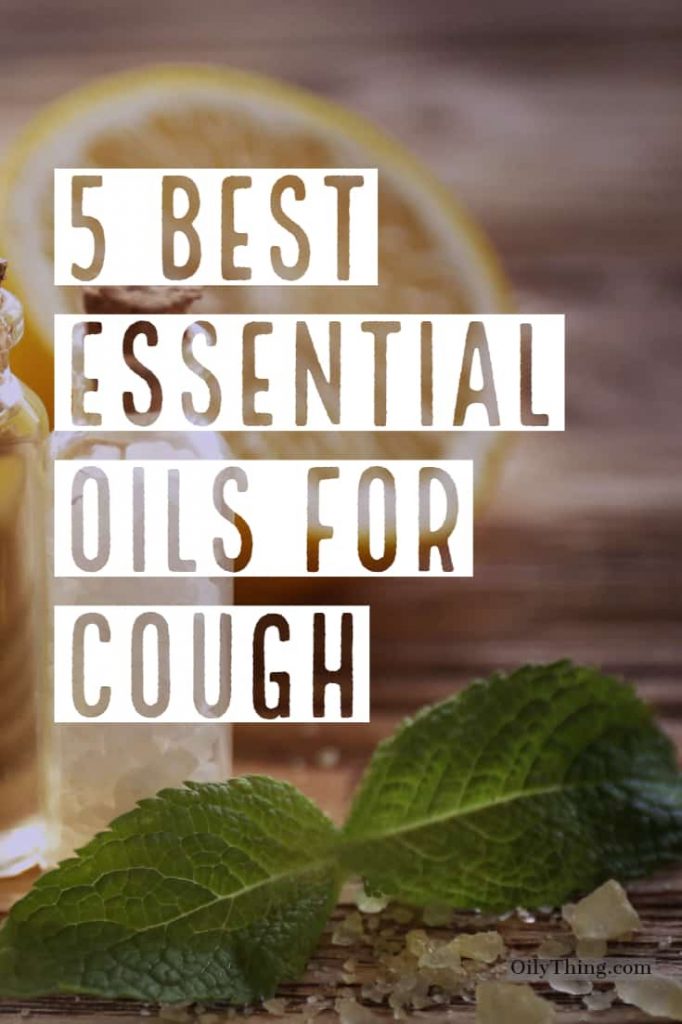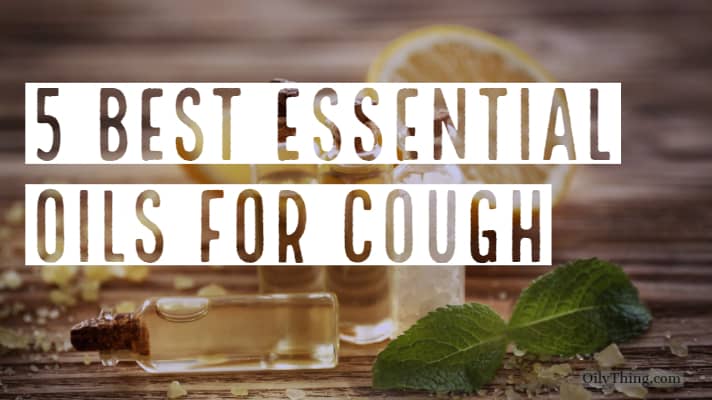Coughs and colds can keep adults, babies, and children up through the night and disrupt daily activities. What do we do? Cough syrups are ineffective for adults, babies, and children, according to research. That leaves us with nature and home remedies. Could essential oils for coughs be a safer and effective alternative? Source: NCBI
In this article, we are going to review the following essential oils:
- Eve Hansen USDA Certified Organic Peppermint Essential Oil
- Plant Therapy Frankincense Essential Oil
- ArtNaturals 100% Pure Lemon Essential Oil
- Handcraft Lavender Essential Oil
- Edens Garden Tea Tree Essential Oil
What Causes a Cough?
Coughs are a relatively common symptom of many illnesses, and it can be a side effect of minor to major inhaled irritants. Most common are coughs associated with your upper respiratory tract, such as the flu or the common cold.
Allergies, smoke, and other airborne irritants can lead to coughing fits. The same applies to bacterial infections present in your lungs like pneumonia and bronchitis. Essential oils might also soothe sore throats associated with upper respiratory conditions.
Types of Cough
- Dry cough: typically viral, but can be bacterial
- Wet cough: can be viral or bacterial
- Whooping cough: viral
- Croup cough: viral
You’ll need to know the type of cough you’re treating. This can alter how you treat it, and it can determine the kind of essential oil you choose.
Concerns about Conventional Cough Treatments
Some adults reach for codeine-laden syrups, which adds to the growing narcotic concerns in the United States. The FDA also warns about giving these to children under the age of 18. Source: narconon
The FDA also suggests that children and babies might not need medication and to let the virus run its course. They recommend humidifiers, broth or soup, and warm beverages to ease coughs and sore throat. We agree these practices can help ease symptoms alongside using essential oils for various types of coughs.
Essential Oils for Cough Carry Less Risks than Conventional Treatments
The largest advantage of essential oils is less worry about drug resistance or putting medicines in your body that might do you more harm than good.
Natural remedies can alleviate your symptoms while you wait to see a doctor, treat many symptoms alone, and they generally work well with other medications.
Another upside to essential oils are the lower side effects. In most cases, there are no side effects if you dilute them properly and don’t ingest them.
Skin allergy is possible, so please perform a patch test before using any new essential oil. This applies to new brands of oils you’ve used before because many companies don’t list botanical sources. You could have a reaction to one plant variety and not another, which is especially so with non-organics or non-GMO species.
How to Choose the Right Essential Oil for Your Cough
Antibacterial or antimicrobial, antiseptic, and antiviral properties will go a long way at addressing numerous types of coughs. However, we also prefer to use oils that open airways and have sedative properties, which can assist in clearing a stuffy nose, break up phlegm, and allow you to rest.
A bonus attribute would be an oil that supports your immune system health too. That extra boost could lessen the length that you’re sick. Other helpful benefits could include expectorant, anti-inflammatory, anti-spasmodic, antitussive, sedative, and analgesic.
Oils for Cough Control
- Frankincense essential oil
- Melaleuca alternifolia
- Oregano
- Lemon essential oil
- Rosemary essential oil
- Peppermint essential oil
- Eucalyptus essential oil
- Lavender essential oil
- Clove essential oil
- Pine essential oil
- Juniper berry essential oil
Understanding the underlying cause of your cough as well as type of cough or accompanying symptoms can assist you in choosing the right essential oil.
Oils for Congested Cough and Sore Throat
- Eucalyptus essential oil
- Lavender essential oil
- Clove essential oil
- Pine essential oil
- Tea tree essential oil
- Oregano essential oil
- Frankincense essential oil
- Peppermint essential oil
Oils for Sore Throat and Dry Cough
- Peppermint essential oil
- Lemon essential oil
- Lavender essential oil
- Frankincense essential oil
- Rosemary essential oil
- Juniper berry essential oil

How to Use Your Essential Oils for Cough Relief
The best way to use these oils will be the method that works for you. That can vary, depending on the cause and type of cough. Personal preference applies too.
Home remedies often blend multiple essential oils to strengthen their healing properties or treat various symptoms. You can purchase pre-blended oils too. As long as you’re correctly diluting topical treatments and not ingesting the oils, you can safely mix and match them to personalize scents and experiences.
Steam inhalations, warm bath with essential oils, sniffing directly from the bottle, rubbing onto the bottom of feet, making homemade creams and ointments, or diffusing in your home can all be beneficial to calming your cough fast. Source: ASPET
Recipes for Cough Relief
Make Your Own Thieves Oil
On the video, thieves oil was a recommendation. You can purchase pre-blended varieties, such as Edens Garden Fighting Five, but it takes common essential oils. This powerful blend could assist in killing bacteria, fungus, and viruses. You can use it topically by rubbing on your hands or your feet, diffuse it, or use it as a household cleaner.
If you apply it to your skin, be sure to use a carrier like
Thieves Oil by the Semi-Crunchy Mama
Ingredients:
- Lemon essential oil
- Clove essential oil
- Cinnamon bark essential oil
- Eucalyptus essential oil
- Rosemary essential oil
- 5ml glass bottle for storage
How much you’ll need will depend on the recipe you use it in.
- Topical dilution: combine 3 drops thieves blend with 1-tablespoon of coconut oil (or another carrier). Apply to the bottoms of your feet and/or hands. You can also apply to your chest and throat.
- Household use: combine recipe with 5-ounces of water
- Diffuser: add 10-20 drops to your diffuser
- Steam inhalation: add 5-10 drops to a large bowl of warm water
- Bath: add 10-15 drops to your warm bath water
DIY “Vapor” Rub—by the Semi Crunchy Mama
This rub might not be suitable for children under two.
Child Safe Cough Oil by Herbalist Natalie
She chooses child-safe alternative essential oils, which could also be ideal if you have sensitive skin.
Is There Controversy Over Natural Remedies and Essential Oils for Coughs?
The Federal Food and Drug Administration (FDA) says essential oils are safe for aromatherapy and topical use if properly diluted (also called GRAS or generally recognized as safe). Drug, treatment, and medical claims they support are on a case-by-case basis and usually require rigorous testing before they will approve it. Source: FDA
Some doctors and researchers believe more study is needed before they’re comfortable recommending essential oils for their patients while others feel a combination of conventional and natural medicine is helpful.
When Do You See Your Health Care Professional?
- Cough lasts three weeks or longer
- 102 degree or higher fever
- Blue lips
- Ear pain that persists
- Labored breathing, wheezing, gasping, or an accelerated breathing pattern
- Not eating/drinking
Source: FDA
5 Essential Oils for Cough Symptoms Related to Your Upper Respiratory Tract
Narrowing the extensive list of essential oils is never an easy job. The criteria we’ve used here is based on scientific evidence, personal experience, and versatility of the oil for future uses.
We do consider the companies that make the oils, their testing practices, and their reputations for providing pure essential oils too.
1. Eve Hansen USDA Certified Organic Peppermint Essential Oil
Eve Hansen is a US-based company that provides outstanding quality essential oils. Small batch practices mean more quality control too.
Pros:
- USDA Certified Organic
- Small batch
- Made in USA
Cons:
- Separate dropper, despite usually being a pro, doesn’t always seal the bottle.
- Sometimes the company fails to send you a dropper
2. Plant Therapy Frankincense Essential Oil
Plant Therapy is a favorite brand of ours because of its excellent disclosure policies. They even provide easy to view kid safe labeling, which is great for busy parents or those with sensitive skin. They also staff certified aromatherapists.
Pros:
- Kid Safe labeling
- Organoleptic and GC/MS Testing
Cons:
- Watery
- Smells similar to tea tree and might not be the woodsy incense scent you might expect
3. ArtNaturals 100% Pure Lemon Essential Oil
ArtNaturals offers you extensive testing and quality control of their oil line. We love that they provide country of origin too as well as complete transparency.
Pros:
- Actually smells like fresh lemon and not citronella
- Fun recipes on the box or online
Cons:
- Despite strong initial scent, it can dissipate quickly
4. Handcraft Lavender Essential Oil
Handcraft delivers quality essential oils, and they bottle in the US. They also offer clear-cut GC/MS testing and responsibly and ethically source their ingredients.
Pros:
- Larger than usual size
- Separate dropper for easy measurements
Cons:
- Doesn’t state what variety of lavender they use or if it’s a blend of both
5. Edens Garden Tea Tree Essential Oil
Edens Garden is a female owned and family owned essential oil business in the US.
Pros:
- Provides origin
- Strong scent
Cons:
- Stronger than expected scent, and since it’s already an overpowering oil, you might not find it therapeutic
Final Thoughts on Oils for Coughs
You could go in numerous directions when picking the best of the best here. While we have to consider scent, we understand the bottom line is which of these essential oils for coughs is most effective out of the five.
Plant Therapy’s Frankincense Essential Oil is our choice. First, you can use it for any type of cough. Second, it’s safe for children and anyone with sensitive skin when adequately diluted. Third, it offers additional immune system support, which you’ll need when fighting illness.
The fourth reason we’re recommending this essential oil is because of the properties it contains. Frankincense has antiseptic, disinfectant, anti-inflammatory, astringent, expectorant, and sedative qualities. Every one of these can help you feel better while addressing the underlying cause of your cough.
The next time you have a cough or cold, don’t reach for the cough syrups and petroleum vapor rubs for relief. Look through your essential oils. Let nature have a chance first.


